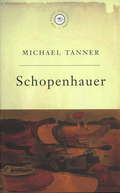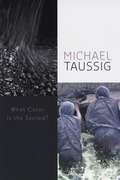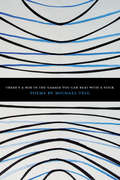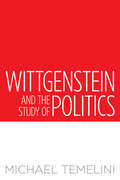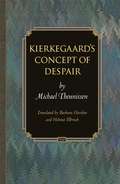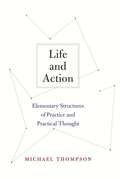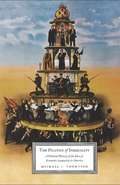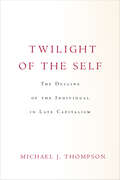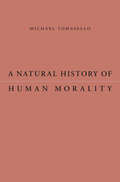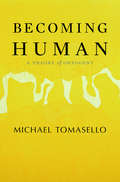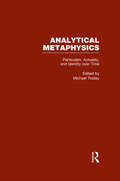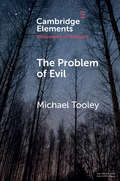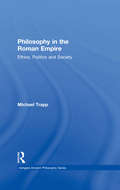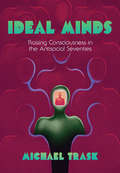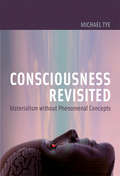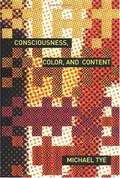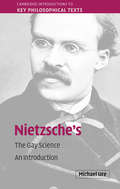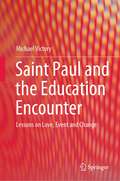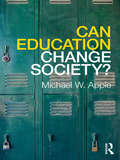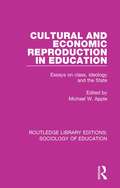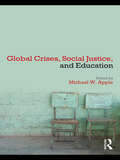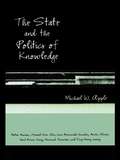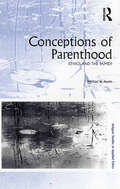- Table View
- List View
The Great Philosophers:Schopenhauer (GREAT PHILOSOPHERS)
by Michael TannerSchopenhauer 1788 - 1860Western philosophy's most profound and unrelenting pessimist, Schopenhauer hymned the miseries of human existence with a joylessness that was little short of lyrical. Yet he thrilled to the beauties of music and art.How did such deep bleakness and such sublime enthusiasm come to coincide in one man, one mind? Only by squaring these two sides of Schopenhauer can we truly hope to understand this most paradoxical - even perverse of thinkers. Only through his thoughts on Beauty can we apprehend his attitude towards Truth.The failure of later philosophers down the generations to resolve these apparent contradictions has seen Schopenhauer's thought unjustly marginalized and philosophy itself much poorer. Michael Tanner's enthralling introduction teases out the difficulties and unpicks the paradoxes to reveal the exhilarating coherence beneath. It amounts to nothing less than a rediscovery of one of Western tradition's greatest philosophers.
What Color Is the Sacred?
by Michael TaussigA meditation on the mysteries of color and the fascination they provoke, this book is the next step on Taussig's remarkable intellectual path. This book uses color to explore further dimensions of what Taussig calls the bodily unconscious in an age of global warming.
What Color Is the Sacred?
by Michael TaussigOver the past thirty years, visionary anthropologist Michael Taussig has crafted a highly distinctive body of work. Playful, enthralling, and whip-smart, his writing makes ingenious connections between ideas, thinkers, and things. An extended meditation on the mysteries of color and the fascination they provoke, What Color Is the Sacred? is the next step on Taussig’s remarkable intellectual path. Following his interest in magic and surrealism, his earlier work on mimesis, and his recent discussion of heat, gold, and cocaine in My Cocaine Museum,this book uses color to explore further dimensions of what Taussig calls “the bodily unconscious” in an age of global warming. Drawing on classic ethnography as well as the work of Benjamin, Burroughs, and Proust, he takes up the notion that color invites the viewer into images and into the world. Yet, as Taussig makes clear, color has a history—a manifestly colonial history rooted in the West’s discomfort with color, especially bright color, and its associations with the so-called primitive. He begins by noting Goethe’s belief that Europeans are physically averse to vivid color while the uncivilized revel in it, which prompts Taussig to reconsider colonialism as a tension between chromophobes and chromophiliacs. And he ends with the strange story of coal, which, he argues, displaced colonial color by giving birth to synthetic colors, organic chemistry, and IG Farben, the giant chemical corporation behind the Third Reich. Nietzsche once wrote, “So far, all that has given colour to existence still lacks a history.” With What Color Is the Sacred? Taussig has taken up that challenge with all the radiant intelligence and inspiration we’ve come to expect from him.
There's a Box in the Garage You Can Beat With a Stick
by Michael TeigMichael Teig's long-awaited second collection is the perfect poetry companion: witty, intriguing, and self-effacing as it picks up overheard conversations and the accidental encounters of everyday life. As Stephen Dobyns wrote, Teig's poems "have this ability to make the world fresh again and make us realize once again why we love the world, despite its failings and our own."
There's a Box in the Garage You Can Beat With a Stick (American Poets Continuum)
by Michael TeigMichael Teig’s long-awaited second collection is the perfect poetry companion: witty, intriguing, and self-effacing as it picks up overheard conversations and the accidental encounters of everyday life. As Stephen Dobyns wrote, Teig's poems "have this ability to make the world fresh again and make us realize once again why we love the world, despite its failings and our own."
Wittgenstein and the Study of Politics
by Michael TemeliniIn Wittgenstein and the Study of Politics, Michael Temelini outlines an innovative new approach to understanding the political implications of Wittgenstein's philosophy. Most political philosophers who have approached Wittgenstein have done so through the idea of therapeutic skepticism, implying politics that privilege conservatism or non-interference. Temelini interprets Wittgenstein differently, emphasizing his view that we come to understand the meanings of words and actions through a dialogue of comparison with other cases. Examining the work of Charles Taylor, Quentin Skinner, and James Tully, Temelini highlights the ways in which all three, despite their differences, share a common debt to that dialogical approach.A cogent explanation of how Wittgenstein's epistemology and ontology can shed light on political issues and offer a solution to political challenges, Wittgenstein and the Study of Politics highlights the importance of Wittgensteinian thinking in contemporary political science, political theory, and political philosophy.
Kierkegaard's Concept of Despair (Princeton Monographs in Philosophy #49)
by Michael TheunissenThe literature on Kierkegaard is often content to paraphrase. By contrast, Michael Theunissen articulates one of Kierkegaard's central ideas, his theory of despair, in a detailed and comprehensible manner and confronts it with alternatives. Understanding what Kierkegaard wrote on despair is vital not only because it illuminates his thought as a whole, but because his account of despair in The Sickness unto Death is the cornerstone of existentialism. Theunissen's book, published in German in 1993, is widely regarded as the best treatment of the subject in any language. Kierkegaard's Concept of Despair is also one of the few works on Kierkegaard that bridge the gap between the Continental and analytic traditions in philosophy. Theunissen argues that for Kierkegaard, the fundamental characteristic of despair is the desire of the self "not to be what it is." He sorts through the apparently chaotic text of The Sickness unto Death to explain what Kierkegaard meant by the "self," how and why individuals want to flee their selves, and how he believed they could reconnect with their selves. According to Theunissen, Kierkegaard thought that individuals in despair seek to deny their authentic selves to flee particular aspects of their character, their past, or the world, or in order to deny their "mission." In addition to articulating and evaluating Kierkegaard's concept of despair, Theunissen relates Kierkegaard's ideas to those of Heidegger, Sartre, and other twentieth-century philosophers.
Life and Action: Elementary Structures of Practice and Practical Thought
by Michael ThompsonIn a book as entertaining as it is enlightening, Kristin Thompson offers the first in-depth analysis of Hollywood's storytelling techniques and how they are used to make complex, easily comprehensible, entertaining films. She also takes on the myth that modern Hollywood films are based on a narrative system radically different from the one in use during the Golden Age of the studio system. Drawing on a wide range of films from the 1920s to the 1990s--from Keaton's Our Hospitality to Casablanca to Terminator 2--Thompson explains such staples of narrative as the goal-oriented protagonist, the double plot-line, and dialogue hooks. She domonstrates that the "three-act structure," a concept widely used by practitioners and media commentators, fails to explain how Hollywood stories are put together. Thompson then demonstrates in detail how classical narrative techniques work in ten box-office and critical successes made since the New Hollywood began in the 1970s: Tootsie, Back to the Future, The Silence of the Lambs, Groundhog Day, Desperately Seeking Susan, Amadeus, The Hunt for Red October, Parenthood, Alien, and Hannah and Her Sisters. In passing, she suggests reasons for the apparent slump in quality in Hollywood films of the 1990s. The results will be of interest to movie fans, scholars, and film practitioners alike.
The Politics of Inequality: A Political History of the Idea of Economic Inequality in America
by Michael ThompsonSince the early days of the American republic, political thinkers have maintained that a grossly unequal division of property, wealth, and power would lead to the erosion of democratic life. Yet over the past thirty-five years, neoconservatives and neoliberals alike have redrawn the tenets of American liberalism. Nowhere is this more evident than in our current mainstream political discourse, in which the politics of economic inequality are rarely discussed.In this impassioned book, Michael J. Thompson reaches back into America's rich intellectual history to reclaim the politics of inequality from the distortion of recent American conservatism. He begins by tracing the development of the idea of economic inequality as it has been conceived by political thinkers throughout American history. Then he considers the change in ideas and values that have led to the acceptance and occasional legitimization of economic divisions. Thompson argues that American liberalism has made a profound departure from its original practice of egalitarian critique. It has all but abandoned its antihierarchical and antiaristocratic discourse. Only by resuscitating this tradition can democracy again become meaningful to Americans. The intellectuals who pioneered egalitarian thinking in America believed political and social relations should be free from all forms of domination, servitude, and dependency. They wished to expose the antidemocratic character of economic life under capitalism and hoped to prevent the kind of inequalities that compromise human dignity and freedom-the core principles of early American politics. In their wisdom is a much broader, more compelling view of democratic life and community than we have today, and with this book, Thompson eloquently and adamantly fights to recover this crucial strand of political thought. In this impassioned book, Michael J. Thompson reaches back into America's rich intellectual history to reclaim the politics of inequality from the distortion of recent American conservatism. He begins by tracing the development of the idea of economic inequality as it has been conceived by political thinkers throughout American history. Then he considers the change in ideas and values that have led to the acceptance and occasional legitimization of economic divisions. Thompson argues that American liberalism has made a profound departure from its original practice of egalitarian critique; it has all but abandoned its antihierarchical and antiaristocratic discourse. Only by resuscitating this tradition can democracy again become meaningful to Americans. The intellectuals who pioneered egalitarian thinking in America believed political and social relations should be free from all forms of domination, servitude, and dependency. They wished to expose the antidemocratic character of economic life under capitalism and hoped to prevent the kind of inequalities that compromise human dignity and freedom—the core principles of early American politics. In their wisdom is a much broader, more compelling view of democratic life and community than we have today, and with this book, Thompson eloquently and adamantly fights to recover this crucial strand of political thought.
Twilight of the Self: The Decline of the Individual in Late Capitalism
by Michael ThompsonIn this new work, political theorist Michael J. Thompson argues that modern societies are witnessing a decline in one of the core building blocks of modernity: the autonomous self. Far from being an illusion of the Enlightenment, Thompson contends that the individual is a defining feature of the project to build a modern democratic culture and polity. One of the central reasons for its demise in recent decades has been the emergence of what he calls the "cybernetic society," a cohesive totalization of the social logics of the institutional spheres of economy, culture and polity. These logics have been progressively defined by the imperatives of economic growth and technical-administrative management of labor and consumption, routinizing patterns of life, practices, and consciousness throughout the culture. Evolving out of the neoliberal transformation of economy and society since the 1980s, the cybernetic society has transformed how that the individual is articulated in contemporary society. Thompson examines the various pathologies of the self and consciousness that result from this form of socialization—such as hyper-reification, alienated moral cognition, false consciousness, and the withered ego—in new ways to demonstrate the extent of deformation of modern selfhood. Only with a more robust, more socially embedded concept of autonomy as critical agency can we begin to reconstruct the principles of democratic individuality and community.
A Natural History of Human Morality
by Michael TomaselloMichael Tomasello offers the most detailed account to date of the evolution of human moral psychology. Based on experimental data comparing great apes and human children, he reconstructs two key evolutionary steps whereby early humans gradually became an ultra-cooperative and, eventually, a moral species capable of acting as a plural agent "we".
Becoming Human: A Theory of Ontogeny
by Michael TomaselloVirtually all theories of how humans have become a distinctive species focus on evolution. Here, Michael Tomasello proposes a complementary theory focused on ontogenetic processes. Built on the essential ideas of Vygotsky, his data-driven model explains how those things that make us most human are constructed during the first six years of life.
Particulars, Actuality, and Identity over Time, vol 4: Analytical Metaphysics (Analytical Metaphysics Ser. #Vol. 4)
by Michael TooleyVolume 4 in the 5-volume series titled Analytical Metaphysics. The essays in this volume are concerned with three main issues. First, what account can be given of the nature of a particular? Second, is identity over time a basic and irreducible relation, or can it be analysed? If so, what is the correct analysis? Third, what account can be offered of what it is to be actual? The final account of this volume involves the claim that actuality is a special property that is possessed by one, and only one, possible world.
The Problem of Evil (Elements in the Philosophy of Religion)
by Michael TooleyChapter 1 addresses some preliminary issues that it is important to think about in formulating arguments from evil. Chapter 2 is then concerned with the question of how an incompatibility argument from evil is best formulated, and with possible responses to such arguments. Chapter 3 then focuses on skeptical theism, and on the work that skeptical theists need to do if they are to defend their claim of having defeated incompatibility versions of the argument from evil. Finally, Chapter 4 discusses evidential arguments from evil, and four different kinds of evidential argument are set out and critically examined.
Philosophy in the Roman Empire: Ethics, Politics and Society (Ashgate Ancient Philosophy Series)
by Michael TrappDrawing on unusually broad range of sources for this study of Imperial period philosophical thought, Michael Trapp examines the central issues of personal morality, political theory, and social organization: philosophy as the pursuit of self-improvement and happiness; the conceptualization and management of emotion; attitudes and obligations to others; ideas of the self and personhood; constitutional theory and the ruler; the constituents and working of the good community. Texts and thinkers discussed range from Alexander of Aphrodisias, Aspasius and Alcinous, via Hierocles, Seneca, Musonius, Epictetus, Plutarch and Diogenes of Oenoanda, to Dio Chrysostom, Apuleius, Lucian, Maximus of Tyre, Pythagorean pseudepigrapha, and the Tablet of Cebes. The distinctive doctrines of the individual philosophical schools are outlined, but also the range of choice that collectively they presented to the potential philosophical 'convert', and the contexts in which that choice was encountered. Finally Trapp turns his attention to the status of philosophy itself as an element of the elite culture of the period, and to the ways in which philosophical values may have posed a threat to other prevalent schemes of value; Trapp argues that the idea of 'philosophical opposition', though useful, needs to be substantially modified and extended.
Ideal Minds: Raising Consciousness in the Antisocial Seventies
by Michael TraskFollowing the 1960s, that decade's focus on consciousness-raising transformed into an array of intellectual projects far afield of movement politics. The mind's powers came to preoccupy a range of thinkers and writers: ethicists pursuing contractual theories of justice, radical ecologists interested in the paleolithic brain, seventies cultists, and the devout of both evangelical and New Age persuasions. In Ideal Minds, Michael Trask presents a boldly revisionist argument about the revival of subjectivity in postmodern American culture, connecting familiar figures within the seventies intellectual landscape who share a commitment to what he calls "neo-idealism" as a weapon in the struggle against discredited materialist and behaviorist worldviews.In a heterodox intellectual and literary history of the 1970s, Ideal Minds mixes ideas from cognitive science, philosophy of mind, moral philosophy, deep ecology, political theory, science fiction, neoclassical economics, and the sociology of religion. Trask also delves into the decade's more esoteric branches of learning, including Scientology, anarchist theory, rapture prophesies, psychic channeling, and neo-Malthusianism. Through this investigation, Trask argues that a dramatic inflation in the value of consciousness and autonomy beginning in the 1970s accompanied a growing argument about the state's inability to safeguard such values. Ultimately, the thinkers Trask analyzes—John Rawls, Arne Naess, L. Ron Hubbard, Hal Lindsey, Philip Dick, Ursula Le Guin, Edward Abbey, William Burroughs, John Irving, and James Merrill—found alternatives to statism in conditions that would lend intellectual support to the consolidation of these concepts in the radical free market ideologies of the 1980s.
Consciousness Revisited: Materialism without Phenomenal Concepts (Representation and Mind series)
by Michael TyeFour major puzzles of consciousness philosophical materialism must confront after rejecting the phenomenal concept strategy.We are material beings in a material world, but we are also beings who have experiences and feelings. How can these subjective states be just a matter of matter? To defend materialism, philosophical materialists have formulated what is sometimes called "the phenomenal-concept strategy," which holds that we possess a range of special concepts for classifying the subjective aspects of our experiences. In Consciousness Revisited, the philosopher Michael Tye, until now a proponent of the the phenomenal-concept strategy, argues that the strategy is mistaken.A rejection of phenomenal concepts leaves the materialist with the task of finding some other strategy for defending materialism. Tye points to four major puzzles of consciousness that arise: How is it possible for Mary, in the famous thought experiment, to make a discovery when she leaves her black-and-white room? In what does the explanatory gap consist and how can it be bridged? How can the hard problem of consciousness be solved? How are zombies possible? Tye presents solutions to these puzzles—solutions that relieve the pressure on the materialist created by the failure of the phenomenal-concept strategy. In doing so, he discusses and makes new proposals on a wide range of issues, including the nature of perceptual content, the conditions necessary for consciousness of a given object, the proper understanding of change blindness, the nature of phenomenal character and our awareness of it, whether we have privileged access to our own experiences, and, if we do, in what such access consists.
Consciousness, Color, and Content
by Michael TyeExperiences and feelings are inherently conscious states. There is something it is like to feel pain, to have an itch, to experience bright red. Philosophers call this sort of consciousness "phenomenal consciousness."
Nietzsche's The Gay Science: An Introduction (Cambridge Introductions to Key Philosophical Texts)
by Michael UreNietzsche's The Gay Science (1882/1887) is a deeply personal book, yet also an important work of philosophy. Nietzsche conceives it as a philosophical autobiography, a record of his own self-transformation. In beautifully composed aphorisms he communicates his central experience of overcoming pessimism and recovering the capacity to affirm joyfully the tragedy of life. On the basis of his experiments in living, Nietzsche articulates his most famous philosophical concepts and images: the death of God, the exercise of eternal recurrence, and the ideal of self-fashioning. This book explains the ancient and modern philosophical contexts that shape Nietzsche's central concern with the affirmation of life. It surveys Nietzsche's philosophy as a whole, explains the pivotal place of The Gay Science as the source of his ideal of tragic joy, and shows how he revives an ancient conception of philosophy as a way of life and the philosopher as physician.
Saint Paul and the Education Encounter: Lessons on Love, Event and Change
by Michael VictoryThis book connects the Biblical Paul’s work as an educator with the revival of interest in Paul’s impact on contemporary social and cultural experience, sometimes referred to as ‘Paul’s new moment’. It presents Paul's letters as being the testament of an educator who brought a radical emancipatory approach to the communities with whom he lived and worked. The book draws on history, philosophy, New Testament studies, and social theory to present the case for Paul as the initiator of a pedagogy of the event. This book explores the concept of a pedagogy of the event, and provides a case study of success in its implementation.
Can Education Change Society?
by Michael W. AppleDespite the vast differences between the Right and the Left over the role of education in the production of inequality one common element both sides share is a sense that education can and should do something about society, to either restore what is being lost or radically alter what is there now. The question was perhaps put most succinctly by the radical educator George Counts in 1932 when he asked "Dare the School Build a New Social Order?", challenging entire generations of educators to participate in, actually to lead, the reconstruction of society. Over 70 years later, celebrated educator, author and activist Michael Apple revisits Counts’ now iconic works, compares them to the equally powerful voices of minoritized people, and again asks the seemingly simply question of whether education truly has the power to change society. In this groundbreaking work, Apple pushes educators toward a more substantial understanding of what schools do and what we can do to challenge the relations of dominance and subordination in the larger society. This touchstone volume is both provocative and honest about the ideological and economic conditions that groups in society are facing and is certain to become another classic in the canon of Apple’s work and the literature on education more generally.
Cultural and Economic Reproduction in Education: Essays on Class, Ideology and the State (Routledge Library Editions: Sociology of Education #53)
by Michael W. AppleFirst published in 1982, this collection of essays provides an analysis of education’s contradictory role in social reproduction. It looks at the complex relations between the economic, political and cultural spheres of society, both historically and at the time of publication, and hones the wider range of debate in on education. This volume will be of interest to those studying sociology and equality in education.
Global Crises, Social Justice, and Education
by Michael W. AppleEducation cannot be understood today without recognizing that nearly all educational policies and practices are strongly influenced by an increasingly integrated international economy. Reforms in one country have significant effects in others, just as immigration and population tides from one area to another have tremendous impacts on what counts as official knowledge and responsive and effective education. But what are the realities of these global crises that so many people are experiencing and how do their effects on education resonate throughout the world? Global Crises, Social Justice, and Education looks into the ways we understand globalization and education by getting specific about what committed educators can do to counter the relations of dominance and subordination around the world. From some of the world’s leading critical educators and activists, this timely new collection provides thorough and detailed analyses of four specific centers of global crisis: the United States, Japan, Israel/Palestine, and Mexico. Each chapter engages in a powerful and critical analysis of what exactly is occurring in these regions and counters with an equally compelling critical portrayal of the educational work being done to interrupt global dominance and subordination. Without settling for vague ideas or romantic slogans of hope, Global Crises, Social Justice, and Education offers real, concrete examples and strategies that will contribute to ongoing movements and counter-hegemonic struggles already active in education today.
The State and the Politics of Knowledge
by Michael W. AppleThe State and the Politics of Knowledge extends the insightful arguments Michael Apple provided in Educating the "Right" Way in new and truly international directions. Arguing that schooling is, by definition, political, Apple and his co-authors move beyond a critical analysis to describe numerous ways of interrupting dominance and creating truly democratic and realistic alternatives to the ways markets, standards, testing, and a limited vision of religion are now being pressed into schools.
Conceptions of Parenthood: Ethics and The Family (Ashgate Studies In Applied Ethics Ser.)
by Michael W. AustinOur parents often have a significant impact on the content of our beliefs, the values we hold, and the goals we pursue and becoming a parent can also have a similar impact on our lives. In Conceptions of Parenthood Michael Austin provides a rigorous and accessible philosophical analysis of the numerous and distinct conceptions of parenthood. Issues considered are the nature and justification of parental rights, the sources of parental obligations, the value of autonomy, and the moral obligations and tensions present within interpersonal relationships. Austin rejects the 'proprietarian', 'best interests of the child', and 'biological' conceptions of parenthood as failing to generate parental rights and obligations but considers more sympathetically the 'custodial relationship', 'consent', and 'causal' conceptions of parenthood and ultimately defends a 'stewardship' conception. Finally Austin explores the 'stewardship' view for practical and moral questions related to family life and social policy regarding the family, such as the education of children, the religious upbringing of children and state licensing of parents.
